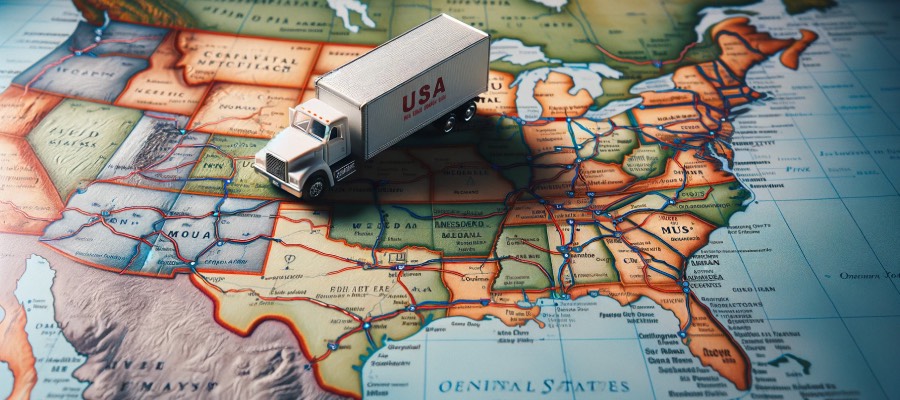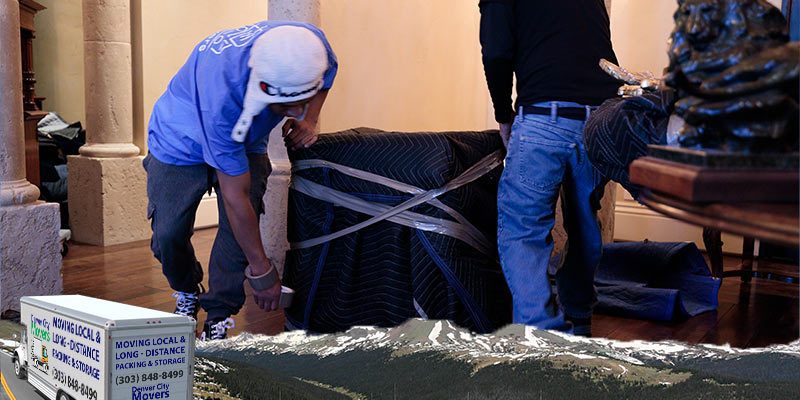There’s really no quick and simple answer to this question since it depends on many different factors. For example, it might be harder to move cross-country if you have a family or children because you have to uproot them from their current school and community.

Decide If Cross-States Moving Is For You
If you’re moving for a job, it might be easier because you have a guaranteed income. Ultimately, it’s essential to sit down and weigh the pros and cons of moving before making a decision.
Making Your Long-Distance Move Easier
Some people find that moving cross-country is a great adventure. They love exploring new places, seeking out new adventures, and meeting new people. For others, it can be a stressful and overwhelming experience. If you’re unsure whether you’re ready for a big move, it might be helpful to talk to someone who has done it before. They can give you some much-needed insight as to what to expect and how to make the transition smoother.
If you decide that moving cross-country is right for you, there are a few things you can do to make the process easier:

Plan Your Cross-Country Move Early
First, start planning early. The more time you will have to sit down and strategize, the less likely you are to feel overwhelmed. If you’re planning on relocating long-distance across the country, it’s crucial to start preparing as early as possible.
This means booking your moving truck and preparing your packing supplies well in advance. If you wait to prepare until the very last minute, you’ll likely run into problems and end up stressed out. By preparing ahead of time, you can easily avoid any potential issues and make sure your move goes smoothly.
Write Down A Game Plan For Your Interstate Move
Second, make a list of everything you need to do and start crossing items off as you go. This will then help you stay organized and will easily keep your details on track.
It’s essential to write down your relocation plans, including a checklist, because you never know when you might need them. Murphy’s Law (you may have heard of it) dictates that anything that can go wrong will go wrong, so it’s always better to be safe than sorry.
By having a written plan and checklist, you’ll know what needs to be done to make your relocation as smooth as possible.
Notify All Relevant Parties About Your Move
In addition to booking your moving truck and gathering packing supplies, there are a few other things you ought do to prepare for your big move.
First, make sure you notify your current landlord or property manager of your plans to move. This way, they can start looking for a new tenant, and you can avoid any penalties for breaking your lease.
Next, notify your utility companies of your move and set a date for them to disconnect your services at your current address. Finally, forward your mail to your new address, so you don’t miss any important bills or letters.

Have A Little Patience
Finally, be sure to pack your patience! Moving can be stressful, but it’s highly important to remember that it’s also an exciting time. When you are moving long distance, it is essential to be patient. If you try to do everything at once, you will quickly become overwhelmed and stressed out. Alternatively, take things one step at a time and relax. Being patient will make the move easier on you and avoid stress by being patient. With a careful bit of planning and timely preparation, you can make it a successful and enjoyable experience.
Ship Furniture Cross-Country
This cannot be easy if you are planning to ship furniture cross-country. It would help if you ensured that the furniture was packaged correctly and had the correct shipping address. Otherwise, your furniture may arrive damaged or not at all. Here are some nifty pointers on how to ship furniture cross-country.

Making Tough Decisions On Your Furniture
When deciding which furniture to move, it is essential to consider how much hassle it will be. Some pieces, such as heavy armoires or large sofas, can be challenging to move and may not be worth the trouble. Instead, consider packing up smaller items like chairs, lamps, and tables. These are easier to transport and will take up less space in your new home.
Move Good Furniture, Cast Off Bad Furniture
When moving furniture, it is essential to focus on the good pieces and leave behind any items that you feel like you can manage without. This will make the move more manageable and less stressful. Additionally, if you have any extra furniture that you do not need, you can always sell or donate it. This will help seperate the vital stuff from the clutter and reduce the amount of stuff you really have to move.

Choosing The Best Cross-Country Movers For Your Furniture
When shipping furniture cross-country, choosing a reputable long-distance moving company is vital. It would behoove you if you also got your shipment insurance if something goes wrong during transit. Make sure to package the furniture properly and label it with the correct shipping address. Also, be sure to track the shipment so that you can be sure it arrives safely.
If you follow these tips, shipping furniture cross-country should be a breeze. Just be sure to do your research and choose a reputable shipping company. With a bit of planning, your furniture will arrive safely at its destination.
Calculating Your Cross-Country Moving Costs
When moving long-distance, preparing your finances is key to a smooth transition. By calculating your expected expenses and having a solid budget in place, you can avoid any surprises or unwelcome financial stress during your move.

What Kind Of Relocation Costs Should I Worry About?
Making a cross-country move can be stressful, even if you are well-prepared. Anticipating all of the expenses, you will incur can help to make the move less stressful. Knowing what to expect financially can help you to budget for the move and avoid any unexpected surprises.
Some of the expenses you will most likely incur include:
- Lodging (if you are driving cross country, you will need to stop for rest breaks)
- Food
- Packing materials (boxes, tape, bubble wrap, etc.)
- Insurance for your belongings during the move
- Storage, if needed
- Cleaning services, if you are renting and need to have the old place cleaned before you leave
- New deposits for utilities at your new place
- Connecting or disconnecting services at your old and new home (internet, cable, etc.)
- Shipping costs for any items that cannot be moved with you
- Car registration fees, if you are moving to a new state
- New driver’s license, if you are relocating long-distance to a new state
- Moving company fees, if you hire professional movers
Some of these expenses may be tax deductible – speak with your accountant or tax preparer to see if you qualify for any possible deductions.
Making a budget for your move and sticking to it can help to make the process less stressful. Planning and being prepared financially can help to ensure that your cross-country move is as smooth as possible.
How To Weigh Out And Expect All Your Expenses
Some critical factors to consider when planning your finances are the cost of transportation, temporary housing, utilities, and storage (if needed). Additionally, be sure to have some financial wiggle room in case of any unexpected costs that may pop up.
Assuming you’ve already saved up for your move, here are a few tips to help keep your finances in check:
- Make a budget and stick to it. This will allow you keep track of your spending and ensure that you’re not overspending.
- Compare prices between different moving companies to get the best deal possible.
- If you’re selling your current home, use a real estate agent to help you get the most money possible for your property.
- Get quotes from multiple storage facilities to find the best price and amenities for your needs.
Following these tips can help make your long-distance move as smooth and stress-free as possible – financially and otherwise!

Conclusion – Moving Cross-Country Can Be Hard But Not Impossible
Long-distance moves can be complex, but with careful planning, they do not need to be stressful. One of the more crucial aspects to remember is to start planning early. This will give you time to gather all of the necessary supplies and make arrangements for your move.
Fail To Prepare, Prepare To Fail
If you take the time to strategize and anticipate every aspect of your move, everything will move seamlessly. You’ll know what needs to be packed and when it needs to be loaded. You’ll have a plan for how you’re going to get your belongings from your old home to your new home. And you’ll have a plan for what to do once you arrive at your new place.
Tough VS Stressful
But even with the best-laid plans, long-distance moves can be brutal. You’re leaving behind everything familiar and starting fresh in a new place. It can be hard to adjust to all the changes, especially if you’re moving to a completely different part of the country.
However, making a long-distance move doesn’t have to be stressful. With the right planning, make it a smooth and successful transition.
